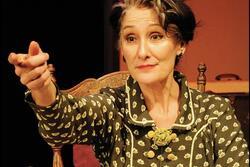A community for queer Orthodox women
As a new “blog roller,” I have been amazed to see what fascinating ideas and communities exist on the dynamic web. Yesterday, I came across Tirtzah: A Community of Frum Queer Women, a multi-author blog associated with an eponymous, in-person community based out of New York City. It’s a new blog – there are only a few posts up yet, but what is there so far, feels fresh and exciting.
Perhaps it was my naivete going into the blog that I expected that many (perhaps even most) of the posts would deal with discomfort, with a general feeling of alienation from the larger community. And there is the option offered to posters to use a pseudonym or remain anonymous while writing. But that doesn’t seem to be the issue at hand. Instead, bloggers write about queer shidduchs (matchmaking), and how the legalization of gay marriage fits into halakha (Jewish law).
Most amazing to me are the posts about how “Orthodykes” are integrated into the larger Orthodox community. Truthfully, I didn’t know that that was happening. Straight Orthodox families are inviting and including gay couples in their Shabbat meals? Orthodox friends upon finding out that their friend is a lesbian expresses concern not about Jewish law but how the child of two women will fit in in an Orthodox day school? I wonder if the women posting on Tirtzah have gotten lucky in finding straight allies in their communities, or if there is in fact a shift in Orthodoxy around the issue of accepting gays and lesbians into the fold. If it is the former, then certainly I commend the individuals and families that are on the vanguard of making Orthodox Judaism more inclusive for all who want to participate. But if it the latter (and still I am not convinced), then perhaps we will begin witnessing a slow sea-change.
With pride month upon us, California (plus sort-of New York) moving in the direction of marital equality, and some Orthodox Jews somewhere accepting their lesbian sisters, I can almost feel a glimmer of hope. But, like I said, I’ve been thought of as naïve.






Ever since my father sexually assaulted me throughout my childhood , I've gravitated toward women and their beauty . Thank you for being a strong voice for us
Just one clarification - Tirtzah is actually for any women who identify as frum, not only those who are Orthodox. While this growing community is planning events in New York City, Tirtzah also has a listserve for members around the world. boediger
Anonymous: Yes, there are people who consider themselves frum who are Conservative or Traditional-Egalitarian or non-denominational. Some people feel that frum can refer to someone who strives to be Torah observant and is shomer shabbos and kashrut even if they don't have Orthodox beliefs, or even if they believe in a level of egalitarianism that doesn't fit within the realms of Orthodoxy. The most Torah observant segment of Conservative Jews could be considered frum, for instance. Of course "frum" is usually shorthand for Orthodox. But it doesn't have to be.
Are there women/people who consider themselves frum who are associated with another denomination of Judaism?
Thanks for this wonderful write-up!
Just one clarification - Tirtzah is actually for any women who identify as frum, not only those who are Orthodox. While this growing community is planning events in New York City, Tirtzah also has a listserve for members around the world.